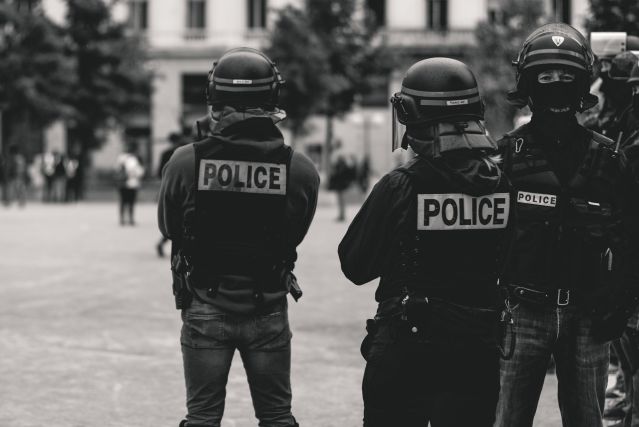Confidence
Do We Trust the Police?
Why have levels of trust fallen in recent years, and what can be done?
Posted April 28, 2023 Reviewed by Tyler Woods
Key points
- The police rely on public trust to effectively execute their duties as law enforcement.
- In recent years, levels of trust and confidence have fallen in the U.S. and U.K. following a series of high-profile incidents.
- Ensuring fair and respectful interactions between public and police, and increasing community policing, can increase levels of trust.
Public trust and confidence in the police are essential for law enforcement to maintain its authority and uphold public order. Without trust, citizens are less likely to report crimes to the police or to cooperate with investigations. Distrust of the police can lead to social unrest and heightened feelings of injustice. Police forces that are trusted by their communities can perform their duties more effectively, which, in turn, helps to foster positive relationships between the police and the communities they serve. Understanding the psychological factors that influence levels of trust and confidence in the police is vital for effective policing.

Recent trends in trust and confidence in the police
High-profile incidents of police misconduct can erode public trust. In recent years, there has been no shortage of examples of police violence and misconduct in the U.S. The killing of George Floyd by police sparked a global response which led to widespread discussions concerning existing racial inequality and the disproportionate use of force by police against Black people. The Global Law and Order Report found that the largest recent decline in public attitudes towards the police was in the U.S., where confidence fell from 82 percent in 2020 to 74 percent in 2022 following several high-profile police shootings.
Trust and confidence in the police have also declined in the U.K. According to the Crime Survey for England and Wales, the number of adults that reported having overall confidence in their local police force fell from 78 percent in 2017/18 to 69 percent in 2021/2022. Earlier this year, the U.K. research group More in Common reported that 68 percent of U.K. adults felt the police have given up on investigating crimes like theft and burglary and 41 percent felt the police are more interested in being ‘woke’ than solving crimes.
The Global Trustworthiness Index compares global perceptions of trust in the police across 26 countries. Between 2021 and 2022, levels of trust in the police dropped from 53 percent to 41 percent in the U.S. and fell from 48 percent to 44 percent in the U.K. However, levels of trust in both countries were still higher than the global average (37 percent). In 2022, trust in the police was highest in the Netherlands (58 percent) and Denmark (58 percent) and lowest in Mexico (13 percent) and South Africa (16 percent). Given the importance of public trust in the police in the U.S. and U.K., it is essential to evaluate the psychological and practical factors that shape levels of trust in order to prevent further declines.
The U.K. Parliamentary Office of Science and Technology (POST) recently published a POSTnote setting out some of the key facilitators of trust in the police. These include: ensuring procedurally fair and just interactions between the public and police; community policing, where police support and collaborate with communities to address local issues; and addressing concerns about police culture.
Procedural Justice
The quality of interactions between police officers and members of the public can impact levels of trust and confidence in the police. Studies have shown that individuals who feel they are treated fairly and respectfully by the police are more likely to trust the police. The principles of procedural justice in policing emphasize four key features for encouraging procedurally "just" encounters between police and members of the public. These include:
- Voice: giving citizens the chance to tell their side of the story;
- Respect: treating people fairly and with dignity;
- Neutrality: making unbiased and logical decisions; and
- Trustworthiness: showing that the motivations of the police are aligned with those of the community.
Procedurally "just" interactions between police officers and citizens can help to build public trust and confidence in the police.
Community Policing
Another approach to promoting trust in the police is community policing. Community policing involves partnering with communities to identify and solve local problems. This approach emphasizes building relationships between police and citizens, rather than simply enforcing the law. Research has shown that community policing can increase trust in the police and reduce rates of crime. Community policing, if done correctly, can lead to a psychological sense of moral alignment between the public and police and the belief that the values of the community are respected and protected by police. This may also help to bridge the gap between police and minority groups, prioritising dialogue and collaboration with groups that may have historical reasons not to trust the police.
Police Culture
Finally, improving police culture has been put forward as a necessary action to address declines in trust and confidence. In the U.S., the 2015 President’s Task Force on 21st Century Policing observed that, though procedural justice practices and community policing consistently show promise for improving trust in the police, their success is ultimately determined by police culture. The task force recommended the need for a shift from a "warrior" to a "guardian" culture of policing. A "warrior" culture views policing as being locked in combat and battling a dangerous enemy. A "guardian" mindset emphasises the importance of protecting and supporting citizens through community relationships.
Research evidence has found that police officers do adopt different role orientations towards their policing duties and that warrior and guardian mindsets are distinct but related constructs. This has implications for training and recruitment, such as the potential benefit of prioritising recruits that indicate a preference for service to the community (i.e., "guardians") for fostering public trust and confidence. That said, we cannot ignore the dangerous and distressing conditions that police officers are required to face on a daily basis. It may be naïve to assume that principles of procedural justice and community policing should be prioritised by police departments when dealing with violent offenders, organised crime, and threats of domestic terrorism. In a world filled with everchanging threats to personal safety, it is the police that we call on to keep us safe. The psychological impact that heightened exposure to risk and danger can have on individual officers may make it difficult to determine what is reasonable to expect of police culture and behaviours.
Trust and confidence in the police are essential for ensuring that they are able to maintain public order. Encouraging approaches to procedural justice, community policing, and improvements to police culture can all play a role in promoting trust and confidence in the police. Existing racial tensions between communities and police, and concerns over the police handling of violence against citizens pose significant challenges to fostering public trust. Recognizing the importance of trust, building positive police-community relations, and addressing police failings are all required for the police to maintain the legitimacy of their authority.




